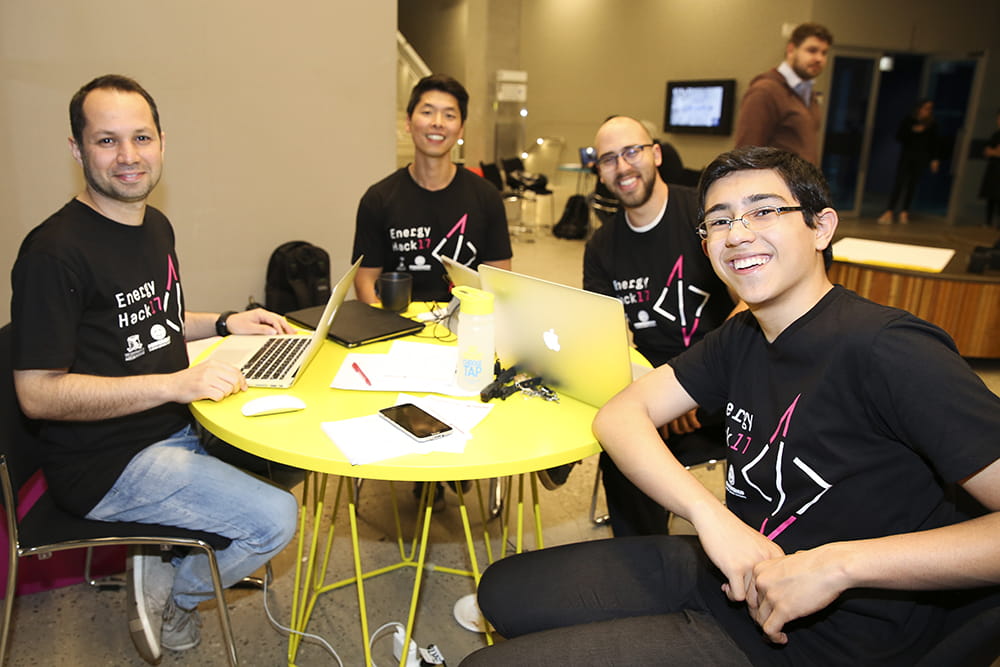The Australian energy sector needs new solutions and new ideas to make energy clean, affordable, and reliable.
Energy Hack is an innovative event that brings together teams of people from diverse backgrounds with a range of skills in order to develop new solutions to real problems. It is run over two days where teams build up their best ideas and pitch them to a panel of judges to compete for the main prize.
Energy Hack 2017 ran in October 2017 and was hosted by the Melbourne Energy Institute and Powershop. The themes were 'Community power' and 'The virtual power plant'. AEMO was a sponsor, alongside the Victorian State Government, Deloitte, City of Melbourne, Citipower/Powercor, Allens, and ZEN Energy.
Seventeen teams pitched their ideas to the judging panel - each team had a fast paced three minutes to present and then take questions and answers. The pitches were judged on five key criteria, including environmental impacts, technical innovation, financial feasibility, social equity and regulatory change or improvement.
Problem statements
There were four problem statements which provided the context for teams to address on the day:
- Regional and rural community energy project
- Design a community energy project for regional and rural Victoria - or potentially elsewhere in rural and regional Australia.
- Urban community energy project
- Design a community energy project for urban Victoria. This could be in the outer or inner suburbs, in high density residential areas or industrial and commercial areas.
- Share the benefits from low emission energy and energy efficiency technologies
- Many renewable technologies are difficult to access for people who are low-income, isolated, and/or disadvantaged.
- New business models for connected energy systems
- New technologies and online services are making new energy business models possible, that would have impossible previously.
Jo Witters, Head of AEMO’s Centre for Innovation, was present at the event as a member of the judging panel, alongside several senior members of the energy community. AEMO also had other staff engaged as participants, and a number of passionate staff gave up their weekends to go along and help mentor hackathon participants to develop creative solutions to the challenges presented.
“It is fantastic for AEMO to be involved in an event like this. The energy sector is changing at such a rapid pace. As Australia’s energy system and market operator, it’s great to be engaging with students and interested members of the community on creative solutions to address current and future challenges.
“The value of sessions like this is that you come away with a really broad range of potential solutions having come at issues from such different perspectives," said Jo.
Seventeen ideas were pitched at the end of the hackathon, with winning team xsSpace taking away the top prize for their idea of an 'AirBnB' marketplace which connects under-utilised rooftop space to energy consumers.
The winning teams presented ideas that delivered benefits to energy consumers through utilisation of the new business models and digital technologies. This reflected the Hack ‘lightning talks’ focus on innovation in ‘fin-tech’ and how this can be utilised by the energy sector.
And the winners…
1. xsSPACE – the winning team xsSpace presented an ‘Air BnB model’ for solar, whereby a marketplace is created that connects consumers that do not have access to rooftop for a PV installation to roofs that are currently free of solar panels.
2. Rentaray – a business model that delivers access to the energy price benefits of solar panels to renters by incentivising landlords to install solar system solutions for their tenants through a model that removes the capital cost for the landlord, provides a financial return to the landlord, and delivers an energy price reduction to the tenant.
3. PowerTwitch – automated bill analysis and switching platform that finds the customer the best available deal - allowing them to exercise their market power 24-7 and change providers month to month, automatically, with no time cost or administrative burden.







